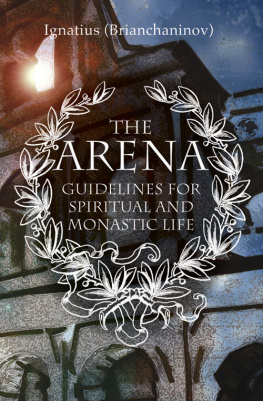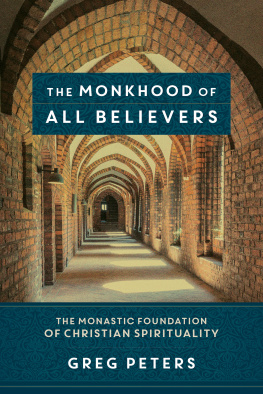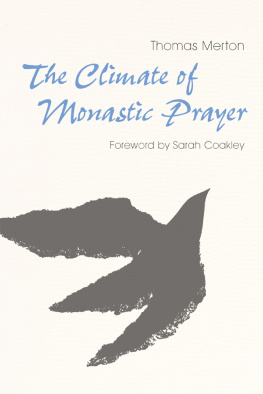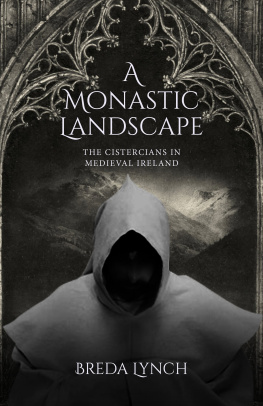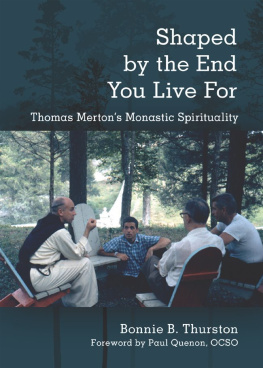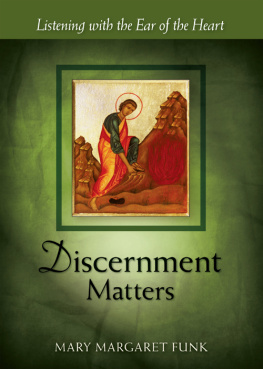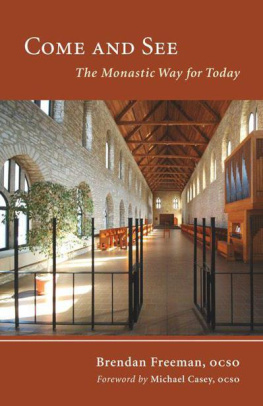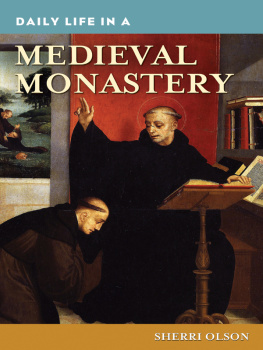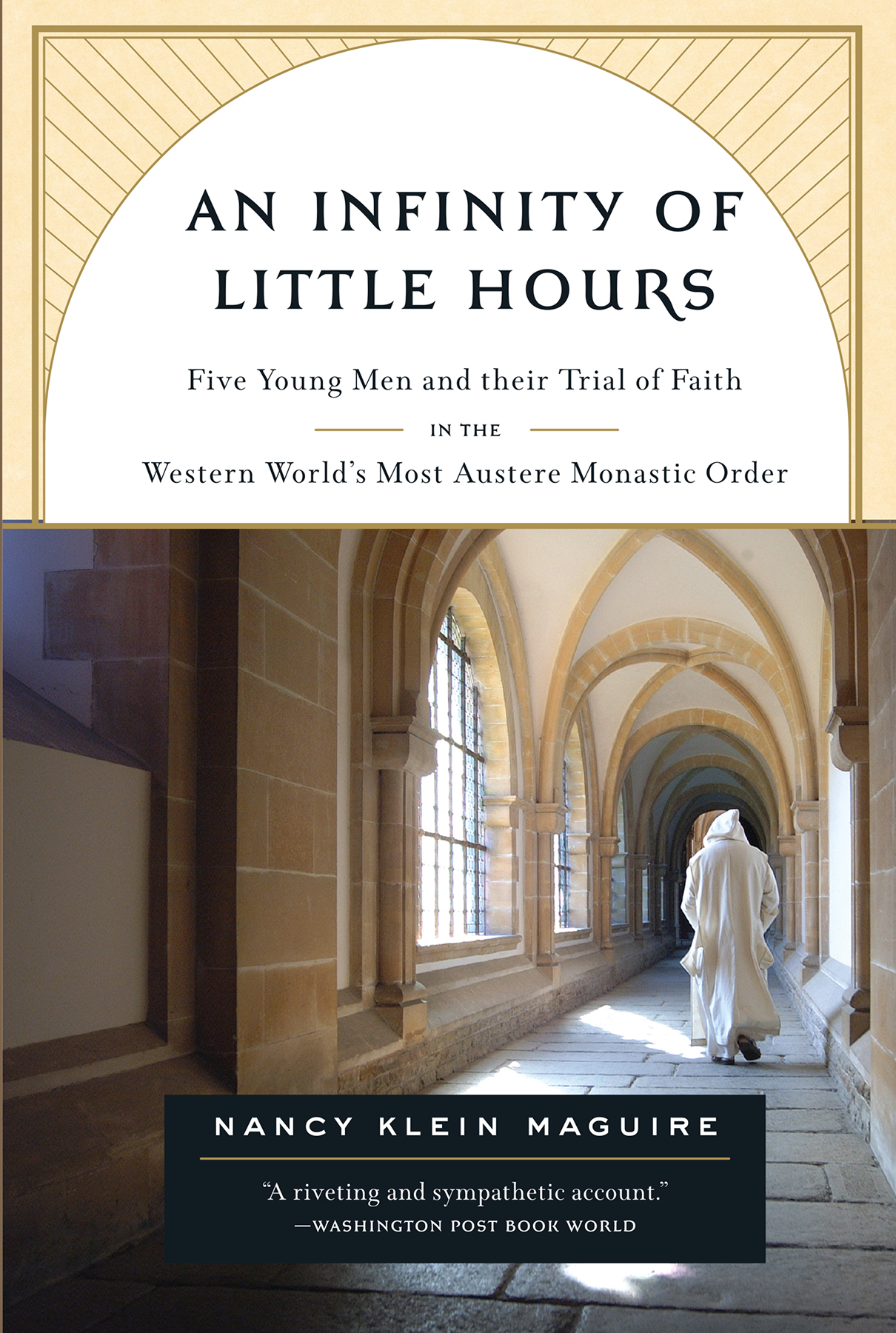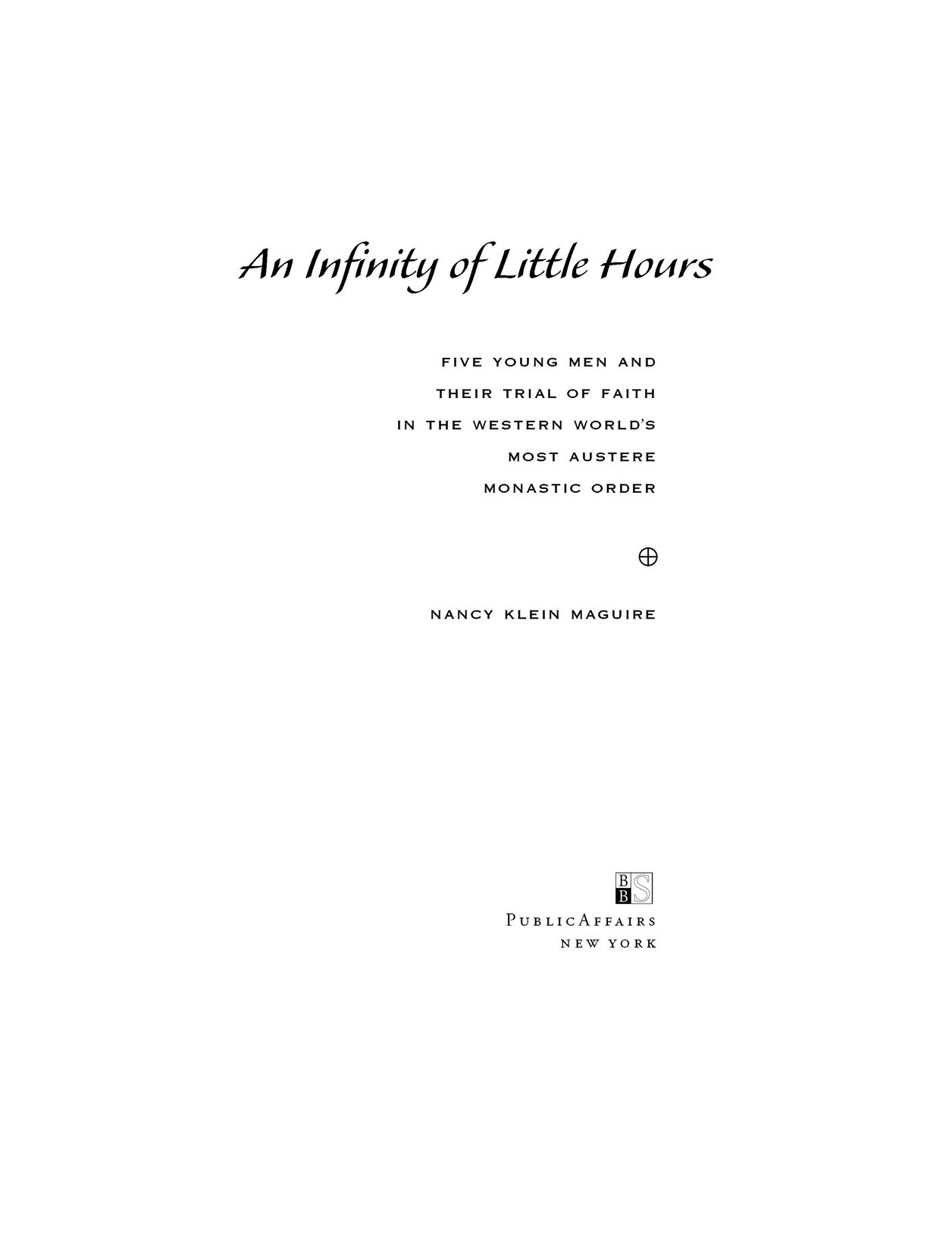Table of Contents
Praise forAn Infinity of Little Hours
It is fascinating to enter, if only for a few hours, into this way of life, where extreme devotion forms at least a bit of a bulwark against humanitys digressions.
Los Angeles Times Book Review
Astonishing... the book does what all great nonfiction does, paints a picture of a world with strokes so well-defined one feels as if he or she has visited it. Reading An Infinity of Little Hours is almost like praying.
MSNBC.com
One might not expect a book about Carthusians, the Western worlds most austere monastic order, to be a page turner, but this sensitively written volume is just that.
America Magazine
If you remember 1948, you may recall Thomas Merton and his Seven Storey Mountain.... All who read the book were thrilled, a thrill I know well and that I recognize as having energized the five young men whose time in a contemplative order Nancy Klein Maguire follows in her fascinating book.... What Ms. Maguire has set herself to doand she does it brilliantlyis to make real to us what one might call the Carthusian experience... Thomas Merton writes of the stress endured by a musician who must cope with the pressures of the plainsong, but Ms. Maguire makes this pressure even more understandable than Merton himself.
SISTER WENDY BECKET, National Catholic Reporter
Nancy Klein Maguire has written an outstanding work of cultural anthropology and oral history. An Infinity of Little Hours does what the best books do: it probes, it teaches, it unsettles, it amazes.
American Scholar
Nancy Klein Maguire immerses us into the mysterious world of this ascetic order with admirable detail and clarity.
San Diego Union-Tribune
[Maguire] evidences a kind of raffish charm not expected in the writings of someone who has spent years toiling among obscure documents and interviewing former monks.... Maguires years of labor bore fine fruit. She preserves the hermetic, harsh life of the Carthusian monksfiercely defended by adherents; piercingly difficult for those who stayed and those who ultimately left its confines.
Seattle Times
The greatest penance in the monastic life is, I suspect, its monotonous regularity. Maguire brilliantly conveys this regularity while also describing how each individual responds to the infinity of little hours.... Too many lay writers on monastic life invoke romantic visions of silent men in cowls padding about cloisters while Gregorian chant plays in the background. Not Maguire. She is a graceful writer who has the added gift of avoiding clichs... Maguire has written a brilliant book, offering a glimpse of that portion of the church which, by design, is a silent witness to the contemplative mission of Catholic Christianity.
Commonweal
Even the most devout and disciplined reader will shiver with the cold, ache with the hunger, and swoon from night after night of interrupted sleep... an unpredictably interesting and well-written tale that, like a good novel, plunges you into their world and makes you wonder how you would fare there.
Catholic News Service
Maguire not only offers a glimpse inside the walls of a Charterhouse, or Carthusian monastery, but also captures a way of life that is now nearly lost.
Science & Spirit
Her interwoven accounts of the five Parkminster novices convey a deep engagement with their emotional struggles.... The author opens the monastery door, providing a vivid account of the orders lifestyle and worship, while also exploring the inner struggles of that life. A moving look at the human search for communion with God at perhaps its most extreme.
Kirkus Reviews
Through painstaking research including countless phone conversations, 5,000 pages of emails, and a reunion of the five men in France, Maguire creates a personal, sympathetic, and amazingly detailed description of an ancient order and its contemporary adherents.
Publishers Weekly
Carthusians are essentially hermits who live in community. They meet in chapel for Mass and the Office; for (silent) meals in the refectory on Sundays; and for a long walk on Mondays in which they can talk in pairs. Otherwise their lives are lived in the solitude of their cells, which are designed to be self-sufficientor more accurately, God-sufficient. Maguires description of these is fascinating.
JACK CARRIGAN, The Catholic Herald UK
A highly detailed and heretofore unseen depiction of intensely private monastic life...
Washingtonian.com
It is the great achievement of An Infinity of Little Hours that it makes us feel the yearning behind this five-hundred-year-old account of mystical union.... The journey can be painful.... Nevertheless, An Infinity of Little Hours is too nuanced and layered a book, too deeply humane, to be called sad or defeatist: starkly beautiful might be more accurate. Maguire is a wonderfully erudite and sensitive guide to the Carthusian worldview. Through her clear, intelligent prose, we come to understand why her five novices are willing to risk everything in a mad, exhilarating search for the divine.
Bustedhalo.com
... When will I come and see the face of God?
Psalm 42:3, quoted by St. Bruno
Give up all else that you may be a man of prayer. Leave the common people on the plain and with Moses climb the mountain to pray to God.
Dom Bonaventure, Prior
Of this there is no doubt, our age and Protestantism in general may need the monastery again, or wish it were there. The monastery is an essential dialectical element in Christianity. We therefore need it out there like a navigation buoy at sea in order to see where we are, even though I myself would not enter it. But if there really is true Christianity in every generation, there must also be individuals who have this need...
Sren Kierkegaard
ACKNOWLEDGMENTS
I am indebted to the generosity of nearly thirty Carthusians for sharing their experience. Clearly, this is their book. One of these ex-monks is my husband, which made the task possible. Twelve other monks have vetted An Infinity of Little Hours.
Dom Ignatius was essential to the project, providing encouragement and information from the beginning to the publication of the book. His journal and copies of Dom Josephs sermons were an essential resource, providing the spine of the book. Brother Peter, the current Procurator of Parkminster, continually gave prompt and generous responses to arcane requests. My friend and fellow author Tom Cody gave me invaluable suggestions and encouragement throughout the six-year process. Professor Kent Cartwright of the University of Marylands English department encouraged the initial effort and made thoughtful comments on an early draft, as did Professor Marshall Grossman on the final draft. Many friends from various professions read drafts of the book carefully and insightfully, including Lawrence Zippin, Gretchen Gehrett, Dr. Elizabeth Rosdeitcher, and Dr. Patricia Hammick. Fr. Michael Holleran read a late draft, providing unique information and encouragement, and Dr. Robert Gerwin provided support throughout the process. Professor James Hogg, the editor of


